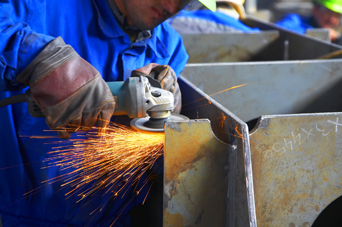Employers’ health and safety responsibilities
Employers have responsibilities for the health and safety of their employees. They are also responsible for any visitors to their premises such as customers, suppliers and the general public.
The Health and Safety at Work Act
The Health and Safety at Work Act 1974 is the primary piece of legislation covering work-related health and safety in the United Kingdom. It sets out a lot of your employers’ responsibilities for your health and safety at work.
The Health and Safety Executive is responsible for enforcing health and safety at work.
Risk assessments
Your employer has a ‘duty of care’ to ensure, as far as possible, your health, safety and welfare while you’re at work. They should start with a risk assessment to spot possible health and safety hazards.
They have to appoint a ‘competent person’ with health and safety responsibilities usually one of the owners in smaller firms, or a member of staff trained in health and safety.
Businesses employing five or more people
For businesses employing five or more people, there must also be:
- an official record of what the assessment finds (your employer has to put plans in place to deal with the risks)
- a formal health and safety policy which includes arrangements to protect your health and safety (you should be told what these are)
Your employer’s duty of care in practice
All employers, whatever the size of the business, must:
- make the workplace safe
- prevent risks to health
- ensure that plant and machinery is safe to use
- ensure safe working practices are set up and followed
- make sure that all materials are handled, stored and used safely
- provide adequate first aid facilities
- tell you about any potential hazards from the work you do – chemicals and other substances used by the firm – and give you information, instructions, training and supervision as needed
- set up emergency plans
- make sure that ventilation, temperature, lighting, toilet, washing and rest facilities all meet health, safety and welfare requirements
- check that the right work equipment is provided and is properly used and regularly maintained
- prevent or control exposure to substances that may damage your health
- take precautions against the risks caused by flammable or explosive hazards, electrical equipment, noise and radiation
- avoid potentially dangerous work involving manual handling (and if it can’t be avoided, take precautions to reduce the risk of injury)
- provide health supervision as needed
- provide protective clothing or equipment free of charge (if risks can’t be removed or adequately controlled by any other means)
- ensure that the right warning signs are provided and looked after
- report certain accidents, injuries, diseases and dangerous occurrences to either the Health and Safety Executive for Northern Ireland or the local authority, depending on the type of business
- Frequently Asked Questions about Health and Safety (Health and Safety Executive website)
- Safe manual work
- Workplace health – a guide from Health and Safety Executive for Northern Ireland
Making the workplace safe and healthy
So that the work premises provide a safe and healthy place to work, your employer should:
- make sure that are properly ventilated, with clean and fresh air
- keep temperatures at a comfortable level (a minimum of 13 degrees Centigrade where the work involves physical activity; 16 degrees Centigrade for ‘stinter’ like offices – there’s no maximum limit
- light premises so that employees can work and move about safely
- keep the workplace and equipment clean
- ensure that areas are big enough to allow easy movement (at least 11 cubic metres per person)
- provide workstations to suit the employees and the work
- keep the equipment in good working order
- make floors, walkways, stairs, roadways safe to use
- protect people from falling from height or into dangerous substances
- store things so they’re unlikely to fall and cause injuries
- fit openable windows, doors and gates with safety devices if needed
- provide suitable washing facilities and clean drinking water
- if necessary, provide somewhere for employees to get changed and to store their own clothes
- set aside areas for rest breaks and to eat meals, including suitable facilities for pregnant women and nursing mothers
- let employees take appropriate rest breaks and their correct holiday entitlement
- make sure that employees who work alone, or off-site, can do so safely and healthily
- Read about working alone (PDF 77 KB)
- Workplace health, safety and welfare (PDF 107 KB)
- Help with PDF files
- Rest breaks
- Holiday entitlements: the basics
What to do next?
You also have responsibilities for your own health and safety at work. You can refuse to do something that isn’t safe without being threatened with disciplinary action. If you think your employer isn’t meeting their responsibilities, talk to them first. Your safety representative or a trade union official may be able to help you with this.
As a last resort, you may need to report your employer to the Health and Safety Executive for Northern Ireland or to the environmental health department of your local authority. If you are dismissed for refusing to undertake an unsafe working practice, you may have a right to claim unfair dismissal at an Employment Tribunal.
- Employees’ health and safety responsibilities
- How to resolve a problem at work
- Protection of whistleblowers
- Unfair dismissal
Where to get help
The Labour Relations Agency (LRA) offers free, confidential and impartial advice on all employment rights issues for residents of Northern Ireland. You can contact the LRA on 028 9032 1442 from 9.00 am to 5.00 pm Monday to Friday.
Your local Citizens Advice Bureau (CAB) can provide free and impartial advice. You can find your local CAB office in the phone book or online.
Source: nidirect.gov.uk




